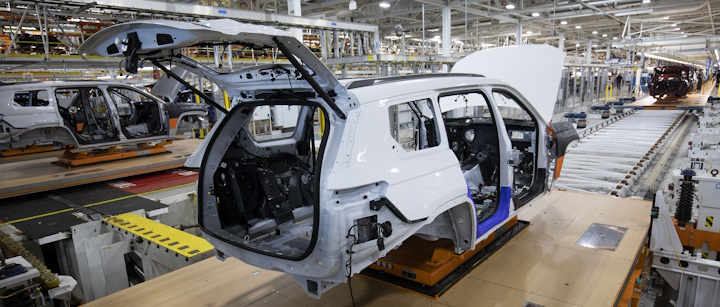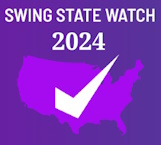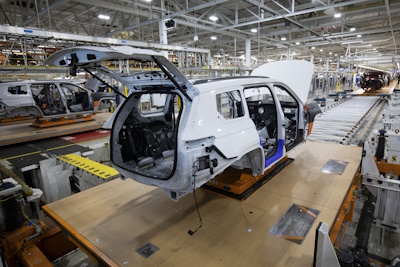
Este artículo estará disponible en español en El Tiempo Latino.
In Michigan, former President Donald Trump has courted voters in the auto industry with false and no-evidence claims about Chinese auto plants in Mexico and auto industry growth under his administration.
- He has claimed that Chinese companies didn’t build auto plants in Mexico when he was in office because he threatened them with high tariffs, “but right now they’re building some of the largest auto plants anywhere in the world ever built” and they will “wipe you out.” There is only one, small Chinese car manufacturing plant in Mexico right now, experts say, and it was announced in 2017, during Trump’s term. Other companies say they plan to build plants, but they haven’t done so yet.
- Trump has promised “to get the auto workers’ jobs back like it was 30 years ago and 40 years ago before everybody left,” saying “we were all set to” bring back the industry “and then we had the COVID disaster come in.” We can’t predict the future, but auto industry jobs declined between 2019 and 2020, before the pandemic, showing no evidence of a pending boom, as Trump said.
Both the Trump campaign and Vice President Kamala Harris’ campaign are focusing on Michigan, a key swing state that Trump won in 2016 and lost in 2020. Trump will visit the state again on Sept. 27. His claims about the auto industry in the state fit a pattern of Trump making false claims about how the industry fared under his presidency compared with Democrats.
Chinese Plants in Mexico
Several Chinese auto companies have said they want to build car manufacturing plants in Mexico, which has raised concerns within the industry and among politicians about those potential plants trying to export the cars to the U.S., particularly cheap electric vehicles that could present stiff competition for the nascent EV industry in this country.

There are few cars exported to the U.S. from China, and the actions and statements by President Joe Biden’s administration, and Trump, indicate they both would like to keep it that way. Cars from China made up 0.49% of U.S. imported vehicles in 2019 and 0.66% in 2023, according to International Trade Commission data. (There is greater trade in automotive parts from China; the share of U.S. imports was 9.96% in 2019 and 9.26% in 2023 for Chinese auto parts.)
In May, the Biden administration increased tariffs on electric vehicles imported from China to 100%; the tariff for all cars, and certain other products, from China had been 25%, set by the Trump administration. Imports of passenger cars from China face an additional 2.5% most-favored-nation tariff.
But those are tariffs on cars coming from China, not China-made goods exported from other countries. This week, the Biden administration proposed banning Chinese-made hardware and software for cars, citing national security concerns, a ban that would apply to Chinese cars no matter where they are produced — such as Mexico.
But so far, the potential threat of China-owned auto plants south of the border remains just that — a threat. There’s only one Chinese auto assembly plant for passenger cars operating in the country now, selling vehicles in Mexico, experts say. Trump, however, has claimed that he put a stop to Chinese auto plant construction in Mexico by threatening 200% tariffs if the cars were to be exported to the U.S. He further claims that such construction on large plants started once he left office and is nearly finished. But experts told us there aren’t auto manufacturing plants under construction right now.
At an Aug. 29 campaign event at Alro Steel in Potterville, Michigan, Trump said, “They’re building, I don’t know if you know, numerous of the biggest auto plants in the world right now … right near the border in Mexico, owned by China. They think they’re going to build the cars and send them in” to the United States. “They’ll take every single job. You’re not going to have any autoworkers within two years, maybe three years. Nobody’s going to be making cars here.”
Trump continued, “I told them, ‘If you do that, we’re going to put tariffs on at 200, 250%. You’re never going to sell one car in this country.’ And they didn’t build them. … As soon as I was gone, they started construction and they’re almost finished, and that’s going to wipe you out.”
At a Sept. 17 town hall event in Flint, Michigan, Trump made the same claims, saying there were “a number of them going up right now,” referring to China-owned plants in Mexico. “They weren’t building anything in Mexico having to do with cars with me, because I said, ‘If you build it, we’re going to put a 200%. You’re not going to sell one car into this country, and but right now they’re building some of the largest auto plants anywhere in the world ever built,” Trump claimed.
Trump made the claim again in Savannah, Georgia, on Sept. 24.
“There’s one Chinese auto plant in Mexico,” Susan Helper, an economics professor at Case Western Reserve University who researches U.S. manufacturing and global supply chains, told us. The company is called Jianghuai Automobile Group, or JAC, and the car plant is “tiny.” JAC’s Mexico factory made 22,000 vehicles last year, or 0.6% of Mexican production, Helper, who worked on the Council of Economic Advisers in the Obama and Biden administrations, said.
Those figures are in a report by Scotiabank Economics that shows General Motors was the largest producer of light vehicles in Mexico last year, followed by Nissan and Chrysler.
The Associated Press also reported that the JAC plant was the only Chinese assembly plant in operation in Mexico. The AP fact-checked similar comments Trump made in his speech at the Republican National Convention. “Jeff Schuster, vice president of automotive research for analytics firm Global Data who tracks auto production, said he knows of no Chinese auto assembly plants under construction in Mexico,” the AP reported.
The JAC investment, in an existing facility near Mexico City, was announced in 2017, early in the Trump administration, and production of its vehicles began not long after, according to media reports.
“Right now, they’re considering it,” Bruce Belzowski, managing director of Automotive Futures, a research group in Ann Arbor, told us of Chinese car companies wanting to set up shop in Mexico. “They haven’t built any yet.”
 A 2021 Jeep Grand Cherokee L goes through assembly at the Stellantis Detroit Assembly Complex-Mack on June 10, 2021. The plant was the first new auto assembly plant in Detroit in 30 years. Photo by Bill Pugliano/Getty Images.
A 2021 Jeep Grand Cherokee L goes through assembly at the Stellantis Detroit Assembly Complex-Mack on June 10, 2021. The plant was the first new auto assembly plant in Detroit in 30 years. Photo by Bill Pugliano/Getty Images.As for Trump’s claim that he threatened 200% tariffs only for Chinese cars coming from Mexico, Belzowski said, “I have intimate knowledge of the Mexican auto industry, and no one ever mentioned that.”
“The auto reporters are usually pretty thorough about this stuff, if they knew about it,” he said. Unless it was “behind closed doors. I don’t know. Who knows.”
We asked the Trump campaign about these claims, but we haven’t received a response.
The United States-Mexico-Canada Agreement, or USMCA, which Trump negotiated, doesn’t allow for a 200% tariff only on Chinese cars exported from Mexico. Gary Clyde Hufbauer, a senior fellow at the Peterson Institute for International Economics, told us in an email that Trump could impose such tariffs, but it “would violate the USMCA” and “Mexico could retaliate according to its choosing. Probably US agricultural exports would be the first hit. Obviously, tariffs of the magnitude indicated by Trump would seriously damage US-Mexico relations, with lots of repercussions.”
The USMCA, which went into force on July 1, 2020, allows for tariff-free exports from Mexico if they meet requirements for components or materials originating in North America and labor wage requirements. At least 70% to 75% of the content of cars and light trucks would have to be from North America — that’s up from 60% to 62.5% under the North American Free Trade Agreement, which USMCA replaced. Products that don’t qualify for tariff-free export would face a 2.5% most-favored-nation tariff for passenger vehicles, as a Congressional Research Service report explains. (The MFN tariff rate for trucks is 25%.)
There is a “joint review” of the USMCA in 2026, so U.S. and Mexico could come to a new agreement.
If future Chinese auto plants were allowed to export tariff-free to the U.S., “will they kill the US industry?” Belzowski said. “They would be a huge challenge for the U.S. industry, for EVs.” But, he said, such competition “would also jumpstart the U.S. industry to get going” on EVs.
There are incentives in place to boost EV production in the U.S., including tax credits of up to $7,500 for consumers to buy them, if the final assembly of the car was in North America, per the Inflation Reduction Act, signed by Biden in 2022. “The Chinese did this like in 2014, 2015. They’ve been giving incentives for consumers and for the rest of their country to build EVs,” Belzowski said. “So we’re about 10 years behind, and we’re trying to catch up.”
BYD, a Chinese company that makes inexpensive EVs, is one of the companies that has said it is looking to build a plant in Mexico for the Mexican market. Its small Dolphin model retails for $10,000-$12,000 in China, a price that suggests a 2.5% most-favored-nation tariff for future exports from Mexico, under the USMCA now, wouldn’t be much of a deterrent. But Jeff Walling, chief of the advanced technology and machinery division at the U.S. International Trade Commission, said in a March presentation for a bipartisan think tank that there were other reasons such a car wouldn’t make for easy inroads in the U.S. market.
In the presentation — which noted that Walling was expressing his own views, not necessarily the ITC’s — he said, “I feel like we often have these news coverage pieces that come out that are like, China’s going to be able to export duty-free from Mexico or that vehicles are going to be so inexpensive that you don’t care about the tariff. And the example that’s often thrown around is like if you have a $10,000 car,” and a 2.5% tariff wouldn’t add much to the cost of the car. But, Walling said, “the $10,000 car is probably just not a vehicle that’s in high demand in the United States,” because of “a really low mileage threshold,” meaning the distance the car can be driven before it needs to be recharged, or a small size that’s not popular in the U.S.
“I think there would be a couple of different things that China would need to overcome to make a vehicle that meets our rules, is affordable and is desirable,” he said.
That presentation also noted that Chinese companies have been saying since the mid-2000s that they plan to export (generally, not from Mexico) to the U.S. market, and it took some time for other countries, like Japan, to gain a market share in the U.S.
Polestar, an EV made by a Chinese-owned company through a joint venture with Volvo, was being imported into the U.S. Last month, the company opened a factory in South Carolina to produce its electric SUV for the U.S. and for export to Europe.
Auto Industry Jobs
At the Aug. 29 campaign event, Trump also promised to bring auto jobs, or the industry, back to the levels they were 25, 30 or 40 years ago, saying this type of growth was set to happen before the COVID-19 pandemic.
“I’m here today with a simple message for the American autoworker and for the American worker: Your long economic nightmare will very soon be over,” Trump said. “Within two, three years, you’re not going to have auto workers in this. If they vote for Trump, we’re going to bring in factories at levels that you’ve never seen before. We’re going to get the auto workers’ jobs back like it was 30 years ago and 40 years ago before everybody left. We’re going to get it back at levels that you’ve never seen. …
“We’re going to bring back your car industry,” he continued. “We’re going to let them build plants, but they’re not building them in Mexico, they’re going to build them in the United States of America. And they’re going to be fired up by our autoworkers. And we’re going to bring them back in numbers that nobody can believe, and I can do it so easily. We were all set to do it, and then we had the COVID disaster come in.”
We can’t predict the future, but we can provide the facts on auto industry jobs.
Nationwide, motor vehicle and parts manufacturing jobs have been generally trending up — leaving the pandemic aside — since about 2010, after the administrations of President George W. Bush and Barack Obama provided federal assistance under the Troubled Asset Relief Program to save General Motors and Chrysler, which were facing bankruptcy.
In Georgia on Sept. 24, Trump left the misleading impression that this wasn’t the case, saying the auto industry “has been decimated by many decades of incompetent leadership both political and at your company.”
Over Obama’s entire eight-year term, starting in January 2009, motor vehicle and parts manufacturing jobs went up by 265,800 jobs, or 38.4%, according to the Bureau of Labor Statistics. The growth came after job losses during the 2007-2009 Great Recession and the implementation of TARP.
When Trump took office, there were 957,100 motor vehicle and parts jobs. In February 2020, before the pandemic hit, that figure was 29,700 higher. Two months later, the number of jobs had plummeted by 358,200. By the time Trump left office, most of those jobs had come back. He ended his term with a loss of 7,800 jobs in the industry.
Under Biden, the general upward trend has continued. Motor vehicle and parts manufacturing jobs have gone up by 128,800, or 13.6%. As of August, there were 1,078,100 jobs. In May, the industry hit the highest level of jobs since July 2006 and has remained above that threshold.
The peak for these jobs, dating back to 1990, was in June 2000, at 1,333,600 jobs. (The long-term peak was in the late 1970s, but the historical data can’t be directly compared with the more recent figures because of a change in industry classifications.)
Trump claimed that a growth in jobs or auto plants was set to happen when he was president, but then the COVID-19 pandemic struck. We asked the Trump campaign for support for his claim, but we haven’t received a response. The data on jobs don’t show evidence of a pending growth spurt.
In fact, before the pandemic, motor vehicle and parts jobs declined by 25,700 from January 2019, when those jobs hit their peak under Trump, to February 2020, before the economic fallout from the pandemic.
Belzowski, managing director of Automotive Futures, told us there’s no evidence that auto industry jobs were set to reach the levels of decades ago before the pandemic. Belzowski said the “only thing he could have done … while he was president, but he did not do it, was bring jobs back from Mexico.” Instead, the USMCA “kept jobs in Mexico.” U.S. automakers were in the country because of lower labor rates and to avoid emissions fines from the Environmental Protection Agency, he said.
Domestic auto production figures also run counter to the idea that the industry was about to return to the levels of decades ago before the pandemic. Production declined every year under Trump. It dropped again in Biden’s first year and increased slightly in 2022 and 2023, according to figures from the Bureau of Economic Analysis. Domestic production has been on a steady decline over the last three decades, with the exception of growth during the first half or so of Obama’s time in office.
As for Michigan specifically, motor vehicle and parts manufacturing jobs went down under Trump, even before the pandemic.
Between January 2017, when Trump took office, and February 2020, before the pandemic caused job losses, motor vehicle and parts manufacturing jobs in Michigan had declined by 3,700, according to BLS data, with 1,800 of those job losses in vehicle manufacturing.
The pandemic then caused large job losses for a few months. Most of those jobs had been recovered by January 2021, when Trump left office, but over his entire term, the number of motor vehicle and parts manufacturing jobs in Michigan had dropped by 8,700, with the vast majority of that loss in parts manufacturing.
Under Biden’s presidency, motor vehicle manufacturing jobs in the state have gone up by 6,900, as of August, but parts manufacturing jobs have decreased by 7,400. So, altogether, manufacturing jobs in the industry in Michigan have dropped by 500.
Editor’s note: FactCheck.org does not accept advertising. We rely on grants and individual donations from people like you. Please consider a donation. Credit card donations may be made through our “Donate” page. If you prefer to give by check, send to: FactCheck.org, Annenberg Public Policy Center, 202 S. 36th St., Philadelphia, PA 19104.
The post Trump’s Problematic Claims on the Auto Industry appeared first on FactCheck.org.

 2 months ago
37
2 months ago
37


